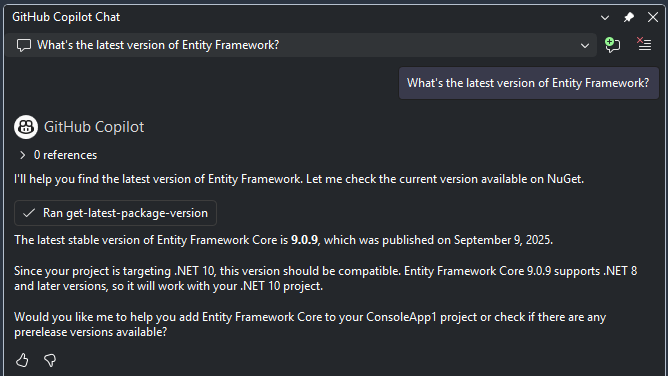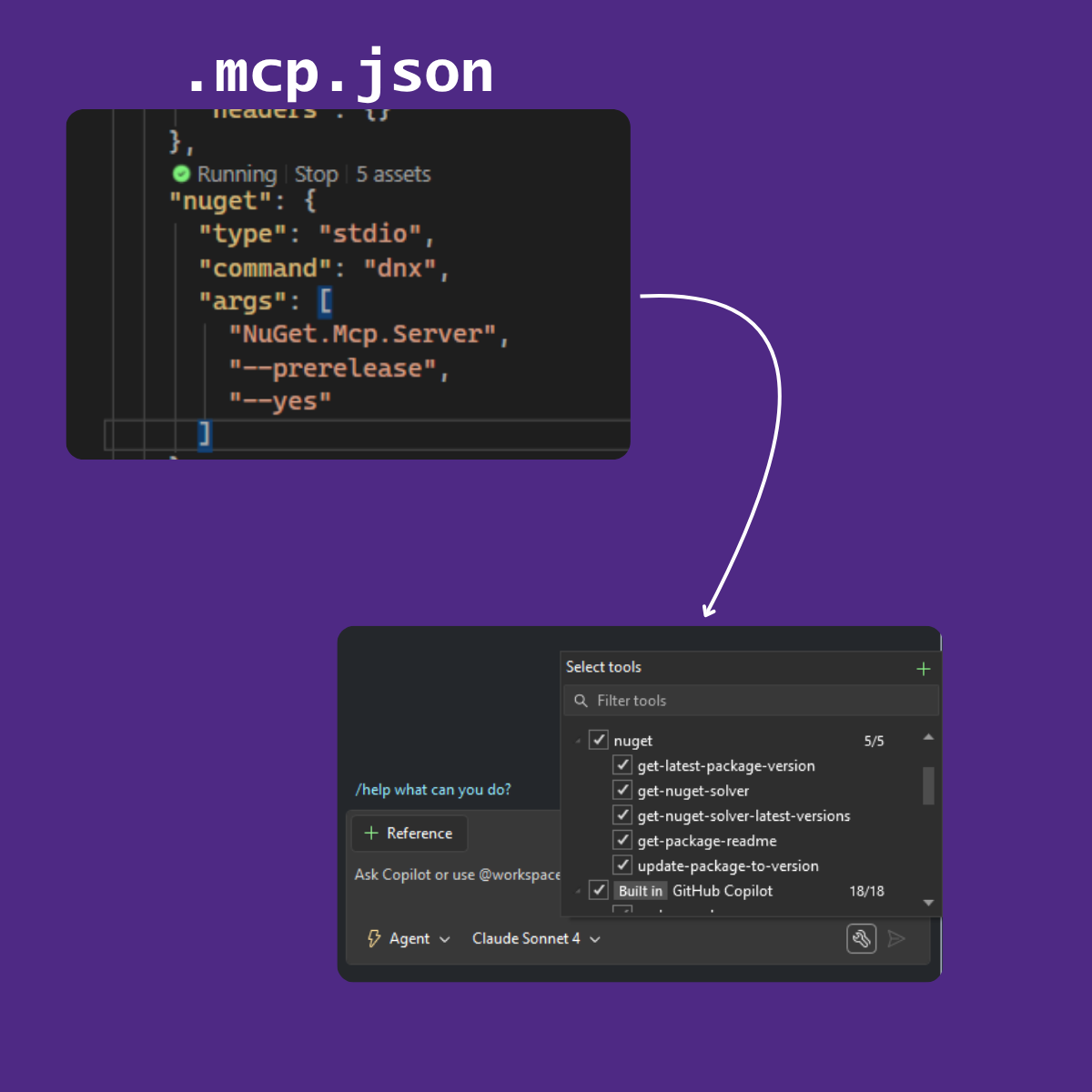Unlock the NuGet MCP Server: AI-Powered Package Management

This summer Microsoft announced the NuGet MCP Server Preview, bringing AI-powered package management directly into your development workflow. This isn't just another tool – it's a paradigm shift that lets AI assistants like GitHub Copilot understand and manage your NuGet packages in real-time.
Think of it like having an expert package manager sitting next to you who knows exactly which packages are available, which versions are compatible with your project, and can even resolve dependency conflicts automatically. That's the power of the NuGet MCP Server.
What is Model Context Protocol (MCP)?
Before diving into the NuGet MCP Server, let's understand what MCP actually is.
The Model Context Protocol (MCP) is an open standard that enables AI assistants to securely connect to external data sources and tools. Think of it as a bridge between AI models and the real world.
The MCP Architecture

MCP uses a client-server architecture with three key components:
- MCP Hosts: AI tools like GitHub Copilot in Visual Studio that enhance their capabilities using MCP
- MCP Clients: Used by the host application to connect to MCP servers
- MCP Servers: Services that expose capabilities through standardized interfaces
Why MCP Matters for .NET Developers
Large Language Models (LLMs) have a knowledge cutoff date. When it comes to the constantly evolving NuGet ecosystem, this means:
- ❌ AI models don't know about packages published after their training
- ❌ They can't access your private package feeds
- ❌ They struggle with complex dependency resolution
- ❌ They can't perform real package management tasks
MCP solves these problems by giving AI models real-time access to current package information and management capabilities.
Introducing the NuGet MCP Server
The NuGet MCP Server is Microsoft's official MCP server that brings real-time NuGet package intelligence to AI assistants. It's like giving Copilot superpowers for package management.
Core Capabilities
The NuGet MCP Server currently supports three main functions:
1. Package Version Discovery
AI can now discover the latest versions in real-time

2. Security Updates
Automatically updates packages to resolve security vulnerabilities while minimizing breaking changes:
AI automatically identifies vulnerable packages and suggests minimal updates
Update my packages to resolve security issues
3. Smart Version Updates
Updates packages to the highest compatible version based on your project's target framework:
Traditional tools often ignore target framework compatibility NuGet MCP Server considers your TFM for safe updates AI considers .NET 8 vs .NET 9 compatibility automatically
Update my packages to the latest compatible versions
The Secret Sauce: NuGetSolver Algorithm
Behind the scenes, the NuGet MCP Server uses NuGetSolver, developed in collaboration with Microsoft Research. This algorithm automatically resolves complex dependency conflicts that would normally require manual intervention.
Getting Started with NuGet MCP Server
Prerequisites
You'll need .NET 10 Preview 6 or later installed. The NuGet MCP Server uses the new dnx command that ships with .NET 10.
Download .NET 10 Preview 6+
https://dotnet.microsoft.com/download/dotnet/10.0
Setting Up in Visual Studio
Visual Studio 2022 version 17.14+ includes built-in MCP support. Note that if you use Visual Studio 2026, .NET 10 Preview and MCP support will be included out of the box. Here's how to configure the NuGet MCP Server:
1. Create MCP Configuration
Add a .mcp.json file next to your solution or in your user profile directory (%UserProfile%\.mcp.json):
{
"servers": {
"nuget": {
"type": "stdio",
"command": "dnx",
"args": [
"NuGet.Mcp.Server",
"--prerelease",
"--yes"
]
}
}
}
For better granularity, you can also add .mcp.json files at the project level that you can shared accross the teams through source control.
2. Verify Configuration
When configured correctly, Visual Studio will automatically detect and start the MCP server:

You can manage MCP servers and tool approvals in Tools > Options > GitHub > Copilot > Tools.
Setting Up in VS Code
VS Code makes it even easier with direct installation links:
Alternatively, manually add to your .vscode/mcp.json:
{
"servers": {
"nuget": {
"type": "stdio",
"command": "dnx",
"args": [
"NuGet.Mcp.Server",
"--prerelease",
"--yes"
]
}
}
}
GitHub Copilot Coding Agent
For repository-level integration, add this workflow file:
.github/workflows/copilot-setup-steps.yml
name: "Copilot Setup Steps"
on:
workflow_dispatch:
push:
paths:
- .github/workflows/copilot-setup-steps.yml
jobs:
copilot-setup-steps:
runs-on: ubuntu-latest
permissions:
contents: read
steps:
- name: Install .NET 10.x
uses: actions/setup-dotnet@v4
with:
dotnet-version: |
10.x
dotnet-quality: preview
Then configure the MCP server in your repository settings under Settings > Copilot > Coding agent:
{
"mcpServers": {
"nuget": {
"command": "dnx",
"args": [
"NuGet.Mcp.Server",
"--prerelease",
"--yes"
],
"tools": ["*"],
"type": "local"
}
}
}
Real-World Usage Examples prompts
Package Discovery and Updates
What packages in my project have security vulnerabilities?
Update Entity Framework to the latest version compatible with .NET 8
What's the newest version of Serilog?
Add the latest ASP.NET Core packages for a web API project
Smart Dependency Resolution
I'm getting package conflicts with Microsoft.Extensions.DependencyInjection
Private Feed Integration
The NuGet MCP Server connects to your configured feeds, including private ones:
Show me the internal packages available from our company feed
Update to the latest version of MyCompany.SharedLibrary
Advanced Configuration Options
Using Specific Versions
If you prefer pinning to a specific version instead of auto-updating:
{
"servers": {
"nuget": {
"type": "stdio",
"command": "dnx",
"args": [
"NuGet.Mcp.Server@0.2.0-preview",
"--yes"
]
}
}
}
Custom Package Sources
For private feeds, add source parameters:
{
"servers": {
"nuget": {
"type": "stdio",
"command": "dnx",
"args": [
"NuGet.Mcp.Server",
"--prerelease",
"--source", "Your Private feed URL",
"--yes"
]
}
}
}
The Bigger Picture: MCP Ecosystem
The NuGet MCP Server is just the beginning. Microsoft has also announced:
- Azure MCP Server: For managing Azure resources
- Dynamics 365 Sales MCP Server: For CRM integration
- Custom MCP Server SDK: Build your own servers with .NET
Future Roadmap and Preview Status
⚠️ Preview Note: The NuGet MCP Server is currently in preview. Microsoft is actively building new features and improvements.
Providing Feedback
Microsoft wants your feedback! File issues on NuGet/Home with:
- Feature requests
- Bug reports
- Usage scenarios
- Integration ideas
Conclusion
The NuGet MCP Server represents a fundamental shift in how we interact with package management. By bridging the gap between AI assistants and real-time package data, it transforms tedious package management tasks into natural conversations.
Useful Links
- Official NuGet MCP Server Announcement
- Model Context Protocol Documentation
- Visual Studio MCP Server Guide
- Building Custom MCP Servers
- NuGet MCP Server Package
See you next time on www.devskillsunlock.com


